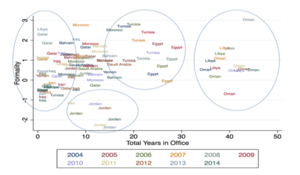Language Patterns in International Relations

Speaker: Dr. Leah Windsor (University of Memphis)
Date: 9 April 2019
Speaker Session Preview
SMA hosted a speaker session presented by Dr. Leah Windsor (University of Memphis) as a part of its SMA Minerva Speaker Series.
During this presentation, Dr. Windsor discussed how computational discourse analysis can help the Department of Defense and intelligence community better understand political trends in the world, particularly in areas that currently lack coverage and are difficult to observe. She presented three research questions: 1) How does what we say reveal who we are?; 2) Is it what we say, or how we say it?; and 3) What biases influence our understanding of international relations? She then explained that one can learn an astonishing amount about individuals’ thoughts, beliefs, and preferences through their language and word choice. This allows us to identify patterns over time and among groups and gives us a better understanding of the world. She also stated that political forecasting has played a significant role in shaping this discipline. Next, Dr. Windsor discussed sources of bias within text. She explained that research about language and politics often has information and/or document processing deficiencies, which can affect conclusions and the generalizability of findings. However, she emphasized the importance of overcoming these deficiencies in order to increase our knowledge of groups that are difficult to observe, such as violent extremist organizations and authoritarian regimes. She used her team’s research on the Rwandan genocide as an example. Dr. Windsor emphasized the importance of using primary source documents and considering word choice when examining a document, as well as considering the language in which it is written. She also discussed how syntax, semantics, sentiment, and topics can affect the interpretation of a document. To conclude, Dr. Windsor described her Minerva 2018 capstone project, the functionality of Coh-MetrixML (a program which allows researchers to analyze syntactic and semantic features within a document in its original language), and noted the directions in which she hopes to take her future research.
Speaker Session Audio File
Briefing Materials
Biography:
Dr. Leah Windsor is a Research Assistant Professor in the Institute for Intelligent Systems at The University of Memphis. She received her Bachelor of Science in Linguistics from Georgetown University in 1998, her Master’s degree in Political Science at The University of Memphis in 2005, and her Ph.D. in Political Science from The University of Mississippi in 2012. Dr. Windsor currently serves as PI for a Minerva Initiative grant administered by the U.S. Department of Defense that examines political communication in authoritarian regimes and opaque political groups. Her work uses computational linguistics and discourse analysis to answer questions about regime survival, comparative institutions, political crisis and conflict, propaganda and persuasion, bluffs and threats, governance, and radicalization. Her interdisciplinary approach to understanding political language is situated at the intersection of political science, linguistics, and cognitive science. She is also interested in issues of bias and ethnocentrism in studying political language, including corpus selection, translation, and document preparation. In February 2017, Dr. Windsor’s lab was selected for a Team Initiation Grant by the University of Memphis’ Division of Research and Sponsored Programs to study multimodal communication including language, nonverbal cues, and audiovisual elements.
The SMA Minerva Speaker Series description and list of the other sessions in this series can be downloaded here.
Comments